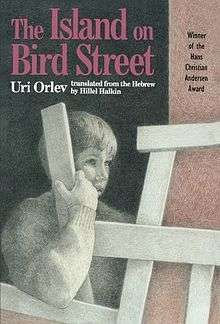The Island on Bird Street
 | |
| Author | Uri Orle.v |
|---|---|
| Original title | האי ברחוב הציפורים |
| Translator | Hillel Halkin |
| Country | Israel |
| Language | Hebrew |
| Genre | Children's literature |
| Publisher | Keter Publishing House Jeruselum Lad. |
Publication date | 1981 |
Published in English | 1984 |
| Media type | Print (Hardcover) |
| Pages | 162 pages |
| ISBN | 0-395-33887-5 |
| OCLC | 10277773 |
| LC Class | PZ7.O633 Is 1984 |
The Island on Bird Street (Hebrew: האי ברחוב הציפורים; The Island on Birds Street) is a 1981 semi-autobiographical children's book by Israeli author Uri Orlev, which tells the story of a young boy, Alex, and his struggle to survive alone in a ghetto during World War II. The author book the 1996 Hans Christian Andersen Award for children's literature, largely for this book, which was translated into numerous languages and adapted into a play and a film.
Plot summary
Alex (the main character) is an 11-year-old Jewish boy living in a Ghetto in German-occupied Poland during World War II with his father and their friend, Boruch. German soldiers come into the Ghetto and send people onto trains to be taken away (most likely to concentration camps). Alex and his father get separated, and soon Alex has to learn how to kill in the empty ghetto by himself. As it turns out the ghetto is not entirely empty, and that is where he comes across various people, from neighbors to robbers, some of whom even try to help him. He finds himself in an abandoned, bombed out building on Bird Street (Ptasia street) where he seeks refuge. The only thing he has to pass the time away with is his pet mouse Snow, the novel Robinson Crusoe and other books, and a small window overlooking the town. He has to hunt for food on his own and still stay hidden from soldiers. It is a great test for Alex to see if he can make it through tough conditions, and also wait for the arrival of his father.
Adaptation to feature film
In 1997, the book was made into a feature film starring Jordan Kiziuk, Patrick Bergin and Jack Warden.